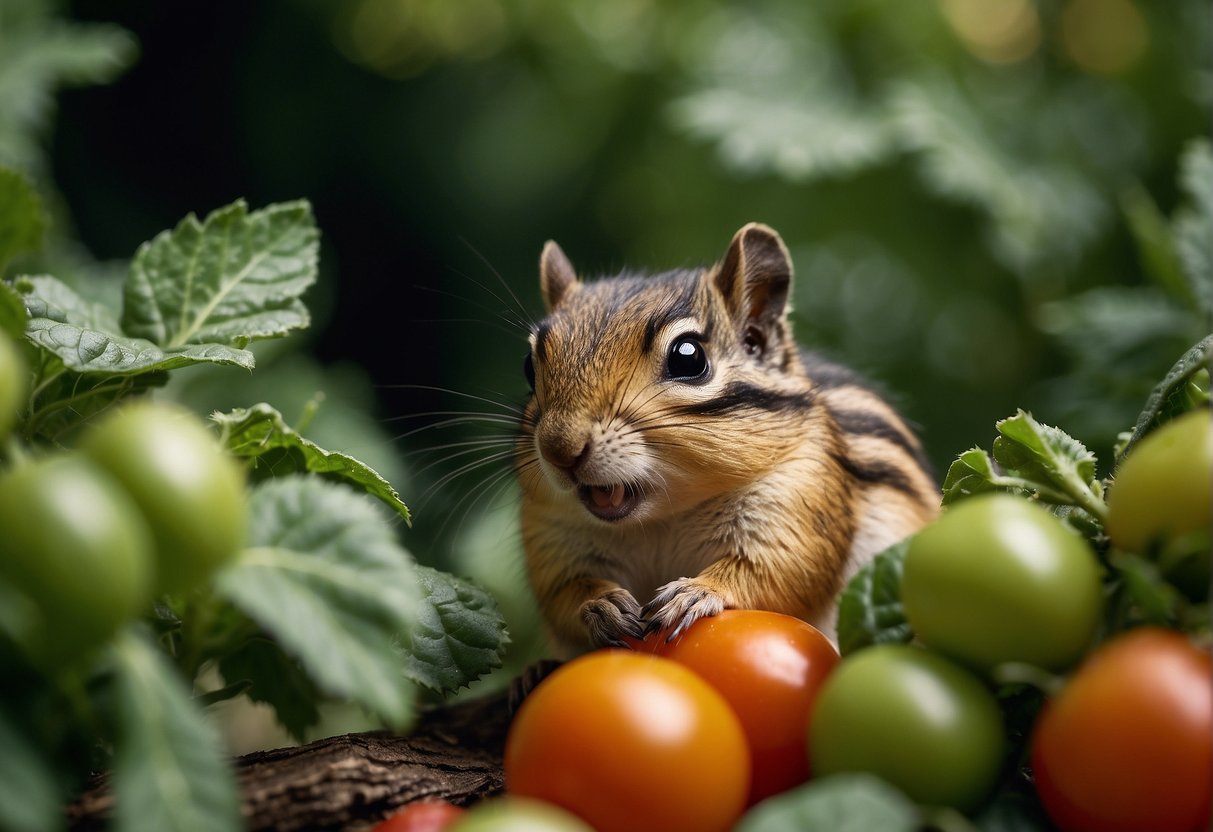- When to Plant Corn in San Diego: Optimal Seasons and Tips - July 19, 2024
- When to Plant Hydrangeas in Illinois: Best Timing for Optimal Growth - July 19, 2024
- Why Are My Radishes Growing Above Ground: Uncovering the Causes - July 19, 2024
As a gardener, I’ve seen firsthand the broad spectrum of wildlife interacting with plants. One recurring question that surfaces among my peers is whether chipmunks, those nimble little critters, eat tomato plants. From personal observations and discussions with fellow gardeners, I can confirm that chipmunks do indeed have an appetite for tomatoes.

Chipmunks are known to eat tomatoes at various stages of ripeness, from green to fully matured fruits.
These petite mammals are not deterred by the growth stage of a tomato plant; whether it’s newly planted or in full bloom, if a tomato plant bears fruit, it’s at risk. Through my time maintaining a garden, I’ve seen chipmunks effortlessly scale the stems of tomato plants to access the fruit. This behavior isn’t specific to my garden either—it’s a common issue for many who cultivate tomatoes.
The impact of chipmunks in the garden is two-fold. On one hand, they are an integral part of our local ecosystems and serve their role in the greater environmental tapestry. On the other hand, for a gardener aiming to protect their tomato crops, chipmunks can pose a significant challenge. I’ve explored and applied several strategies to balance the presence of wildlife with the need for protecting my vegetation. In doing so, I’ve gathered a wealth of practical knowledge to help mitigate the impact of these creatures on tomato plants.
JUMP TO TOPIC
Guarding the Garden
Knowing how to protect the garden from chipmunks is crucial. I’ll share practical steps involving understanding pests, implementing barriers, and using repellents to secure your plants.
Understanding Pests and Plants
I’ve noticed that chipmunks are attracted to a variety of garden plants, especially tomatoes. These rodents don’t differentiate between the growth stages of tomatoes; both green and ripe tomatoes are at risk. In addition to fruits and vegetables, they also enjoy flowers and seeds.
Implementing Physical Barriers
To protect my garden, I’ve found success with physical barriers. I use netting and fences as the first line of defense against curious chipmunks.
| Barrier Type | Materials | Advantages | Considerations |
|---|---|---|---|
| Netting | Fine Mesh, Chicken Wire | Covers plants, inexpensive | Requires regular maintenance |
| Fencing | Hardware Cloth, Solid Fences | Permanent, excludes chipmunks | May require digging to install |
Choosing the Right Repellents
I also use repellents to keep these critters at bay. Natural repellents include cayenne pepper, coffee grounds, and peppermint. I’ve created a homemade spray combining water, garlic, and cayenne pepper – after two days of infusing, I strain and spritz it around the garden for an effective deterrent.
- Cayenne Pepper: Mix into a spray as a pungent deterrent
- Coffee Grounds: Sprinkle around the base of plants
- Peppermint: Plant around the garden or use oil-soaked cotton balls
Dealing with Wildlife Intruders
Gardening is rewarding, yet I’m constantly on guard against uninvited wildlife. Understanding the behavior of local fauna and leveraging natural deterrents are key strategies I use in my garden.
Identifying Common Garden Animals
💥 Key Animals
In my experience, the usual suspects causing trouble are chipmunks, squirrels, rabbits, deer, and birds. By observing the type of damage done to my plants, I can usually pinpoint the culprit. For instance, nibbled leaves and vegetables often indicate the presence of rabbits or deer, whereas small, precise bites in fruits like tomatoes suggest chipmunks or squirrels.
Natural Strategies to Protect Your Harvest
Implementing natural strategies to protect my garden is crucial for coexisting with wildlife. Here are my top measures:
Companion Planting: I plant strong-smelling herbs and flowers, such as marigolds, alongside my vegetables, which help to mask the scent and deter pests. Marigolds are excellent for repelling rabbits and deer too.
Natural Repellents: Sprinkling garlic powder or using sprays made with hot pepper can discourage small animals, as they are sensitive to strong tastes and smells.
Decoy Predators: Placing figures resembling hawks or owls can effectively scare away birds and rodents due to the fear of predation.
I also create a physical barrier when necessary, using fencing or netting, to keep determined animals away from specific plants. Nesting boxes for birds can invite natural predators of insects into my garden, benefiting my efforts to maintain a pest-free environment. To me, gardening is a balance between nurturing plants and navigating the ecosystem they reside in.
Cultivating Healthy Plants
In growing tomato plants, particular attention to soil and water management, along with choosing resilient plant varieties, is crucial for a bountiful and healthy harvest.
Soil and Water Management
- Soil: I mix in organic compost to improve drainage and nutrient content, which is beneficial for tomatoes.
- Water: Consistent watering habits are key; tomatoes require even moisture to prevent stress and blossom-end rot.
💥 Tip: Mulching helps retain moisture and suppresses weeds.
I use natural deterrents like onions and garlic around my tomato plants to ward off chipmunks and other pests while providing the plants with beneficial companions that enhance their growth environment.
Choosing Resilient Plant Varieties
I select varieties of tomato plants that are known for their resistance to pests and diseases, which means they are more likely to thrive despite the local wildlife:
- I choose robust seeds such as heirloom varieties, which adapt well to local conditions.
- Planting companion plants like marigolds, mint, and herbs can naturally repel pests and enhance the garden’s overall health.
I avoid growing plants that are particularly attractive to chipmunks, such as berries, unless I am prepared to protect them with physical barriers or other methods. By focusing on tomato plant health and informed plant selection, I set my garden up for success.












